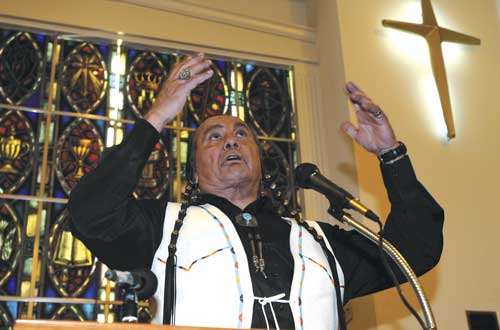Posted: December 28, 2007
by: Jerry Reynolds / Indian Country Today

AP Photo/Stephen J. Boitano -- Activist and actor Russell Means spoke at a
news conference in Washington Dec. 19 on the Lakota withdrawal from all
treaties with the U.S. government.
WASHINGTON - Territorial sovereignty is not vested in individuals or groups
of individuals, but in governments. Under international law, even
governments aren't considered sovereign until recognized by another prior
sovereign.
That may explain the assiduous attention paid on Dec. 19 by Lakota activist
Russell Means to Mario Gustavo Guzman Saldana, the ambassador of Bolivia to
the United States. Means led the Lakota Freedom Delegation to the Plymouth
Congregational Church in Washington, where he declared a Lakota withdrawal
from all treaties with the U.S. government. Saldana was the only diplomat on
hand, and Means repeatedly took note of a skeleton media turnout.
He contended that since 1855, when Lakota nations granted a right-of-way to
the U.S. government for roads through to Montana gold fields, Lakota
territories have been illegally occupied and guiding treaties broken.
He stated from the start that the delegation does not represent contemporary
tribal governments under U.S. law. Tribal governments organized under the
Indian Reorganization Act of 1934 he termed ''those Vichy Indians,
collaborators, beggars''; and non-IRA tribal governments he described as
''de facto colonial governments.''
They were all ''set up by the United States government to ensure our
poverty, to ensure the theft of our land and resources,'' he added.
''No, we do not represent the beggars of Indian country. We do not represent
even the diaspora of our nation. ... Our diaspora is massive, and has now
resulted in two and three and four generations of what I would call lost
Indians. Now the statistics of our deprivation make it mandatory that we
have to become independent. And that independence, which covers a five-state
area - Nebraska, South and North Dakota, Montana and Wyoming, parts of those
states ... we have come here to the United States of America's citadel
[Washington] of empire, and withdrawn from that empire, re-establishing our
independence. Understand we are not seceding.''
Means said the delegation will permit non-Indians to live within the
traditional Lakota dominions, on condition that they respect Lakota life and
culture. He offered them the incentive of not paying taxes as long as they
renounce their U.S. citizenship.
Indian youth suicide rates prompted the announcement of a policy that has
been evolving for more than 30 years, Means said. Another member of the
delegation, Phyllis Young, confirmed that a ''document of continuing
independence'' had been drafted among traditional Lakota chiefs in 1974.
''The suicide rate is very high in my homeland. And it's going on too long -
going on 10 years that we are trying to keep the spirit alive for our
children and our grandchildren. We have to seek alternative means
economically. We have to seek alternative means so that our people can
survive. We are the predecessor sovereign in this country. We have historic
relationships, 33 treaties with the United States of America that they have
not abided by, that they have not lived by. And they continue to take our
land, our water, our children. ... Our people are still in our infancy to be
creative and proactive according to our culture, according to our rules and
our spirituality. When we, our grandparents and our parents have been
stripped of that spirituality, and we continue to suffer, we have no choice.
And we were mandated in 1974 to address this to the national community, to
the United States of America.''
The State Department did not respond to the delegation's mandate, she said.
Means was not to be moved by any consideration of historical contingency.
His reference to ''Vichy Indians'' likened some tribes to the
collaborationist French state under Nazi occupation during World War II.
What would Means say to Indians who might argue that over the course of 150
years, ''collaboration'' should be viewed as something else again: a genuine
necessity of survival, for instance?
''Goodbye. That's what I say to them.''
© 1998 - 2007 Indian Country Today. All Rights Reserved